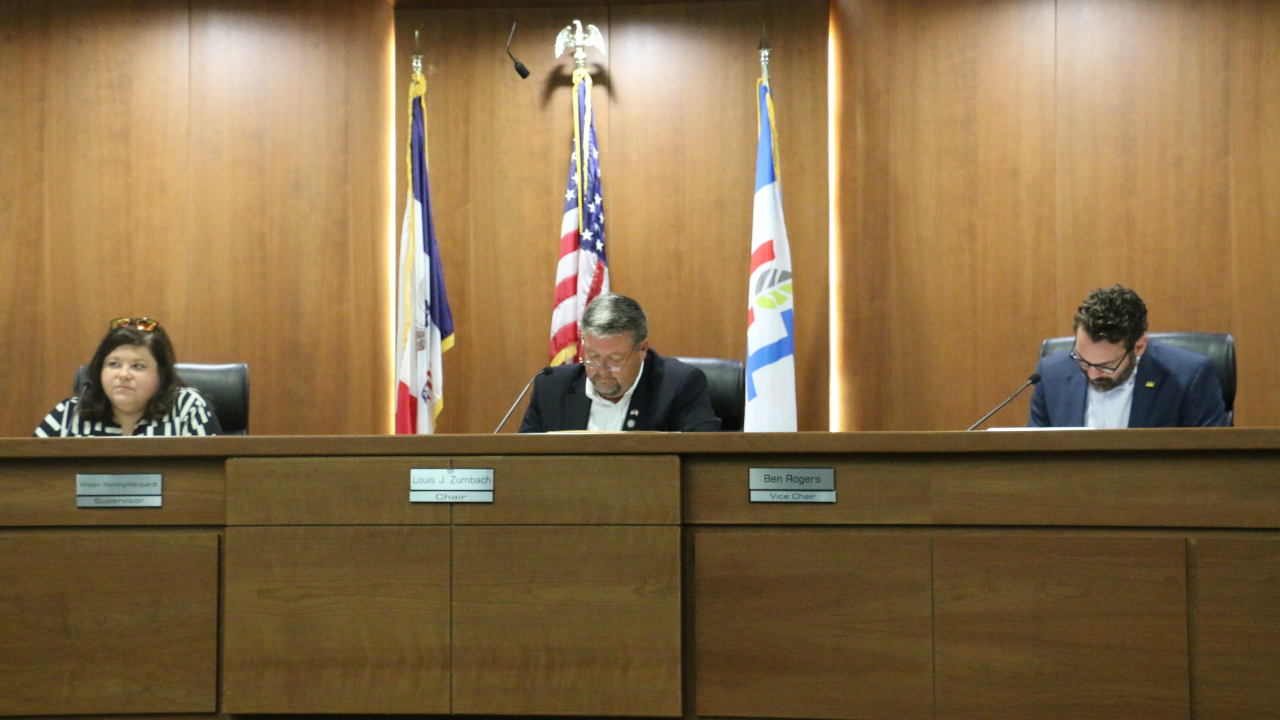
A revised Linn County ordinance governing the development of industrial-scale solar installations is just one reading away from becoming official. The Linn County Board of Supervisors approved the second reading of the amended ordinance Wednesday. The final reading is scheduled for Sept. 20, just days before the county’s moratorium on consideration of new industrial-scale solar […]
Already a subscriber? Log in
Want to Read More?
Get immediate, unlimited access to all subscriber content and much more.
Learn more in our subscriber FAQ.
- Unparalleled business coverage of the Iowa City / Cedar Rapids corridor.
- Immediate access to subscriber-only content on our website.
- 26 issues per year delivered digitally, in print or both.
- Support locally owned and operated journalism.
Do you want to read and share this article without a paywall?
Click here to purchase a paywall bypass linkA revised Linn County ordinance governing the development of industrial-scale solar installations is just one reading away from becoming official.
The Linn County Board of Supervisors approved the second reading of the amended ordinance Wednesday. The final reading is scheduled for Sept. 20, just days before the county’s moratorium on consideration of new industrial-scale solar projects is set to expire.
The amended ordinance includes stricter guidelines for proposed developers of industrial-scale solar projects in Linn County.
The process of revising the 50-page ordinance was launched in the wake of officials’ extensive review – and eventual approval – of three utility-scale solar projects, including the Coggon Solar project and the Duane Arnold Solar I and II projects, all located in Linn County.
In the wake of those approvals, the board of supervisors implemented a moratorium in October 2022 on consideration of new utility-scale solar projects in Linn County, while four county-appointed committees examined issues raised in the contentious approval processes and drafted reports suggesting changes in county solar policies.
The committees met several times in the first half of 2023 and forwarded reports to Linn County Planning & Development staff, which then used statements from the committees, board of supervisors, and the public to draft the proposed ordinance changes.
Those changes address a host of issues ranging from setbacks from neighboring properties to panel heights, viewshed screenings, impacts on agriculture, vegetative plantings and soil protection, development standards, decommissioning procedures, and many more.
The Linn County Planning Commission voted in August to forward the revised ordinance to the supervisors for further consideration, and suggested a series of revisions approved by the board during a public hearing Sept. 5. Those changes include specifying that site operators be responsible for cleanup of any storm damage, that land tenants be notified of any zoning changes in addition to landowners, and that the term “agrivoltaics” be more specifically defined as “the practice of combining solar energy generation with agricultural activities on the same land parcel.”
Several other revisions were then suggested at Tuesday’s meeting, including the process for measuring noise generated by the solar energy equipment; reducing the minimum solar panel heights from 32 to 24 inches above the ground at full tilt; reducing the required soil sampling protocol to once every five years, after the initial pre- and post-construction tests are completed; clarifying the criteria that would be considered a full repowering of a solar energy system; and classifying the review process for standalone Battery Energy Storage Systems (BESS) as a rezoning proposal, rather than a full conditional use request.
Supervisor Kirsten Running-Marquardt also asked if the final version of the amended ordinance could include language that encourages the use of local labor for installing solar projects. Linn County Planning and Development director Charlie Nichols noted the county can’t legally require the use of local laborers, but that he would inquire with the county attorney’s office on other possible options.
All proposed changes will be considered during the board’s final vote on the modified ordinance, slated for 10 a.m. Sept. 20.
Along with that vote, the supervisors will also discuss a draft resolution to adopt a scorecard to help evaluate new industrial-scale solar proposals. Under the scorecard, proposed developers could earn points for various criteria such as planting local seed mixes, siting projects on land with lower Corn Suitability Rating (CSR) metrics, minimizing site grading during construction and providing exceptional Good Neighbor practices through compensation or other methods.
Some commenters at the Sept. 13 meeting raised concerns about the scorecard, saying it imposes a rigid evaluation standard on proposals that could have numerous variables in play.
“We continue to be concerned about the existence of a scorecard in your draft ordinance,” said Swati Dandekar of Marion, representing Bright Future Iowa, a solar energy advocacy group. “A good ordinance sets appropriate conditions under which projects can be approved, built and operated. A good ordinance also allows unique circumstances and conditions which define every project to be appropriately considered. Scorecards, by their very nature, demand a one-size-fits-all approach. But the modern economy, and certainly the economy of the future, need a more customized approach.”
Other commenters raised concerns about the Corn Suitability Rating (CSR) standard included in the scorecard proposal.
“A landowner should not be limited on what soil quality they can lease for solar,” said a statement from Doug and Brenda Martens of Toddville, who have already agreed to lease their land for solar panel installation. “It is a landowner’s right to use whatever CSR land they own. CSR is an unfair assessment on NextEra (the developer of the Duane Arnold Solar projects) when a landowner chooses to enroll high CSR land.”
If the scorecard is implemented, a minimum score of 100 will be required for a utility-scale solar project to receive approval.
The proposed ordinance changes and the solar scorecard are both posted to Linn County’s website.